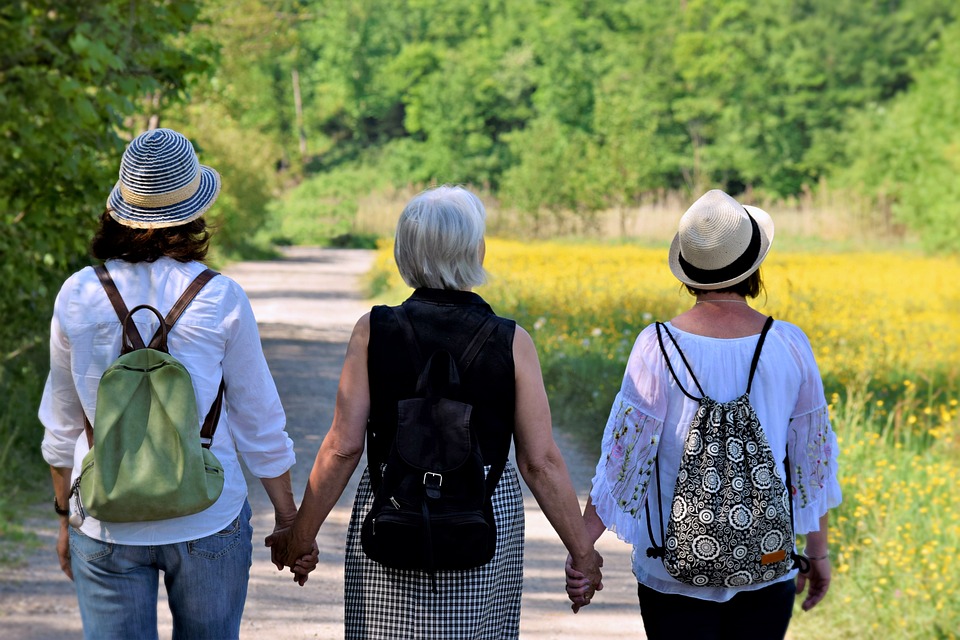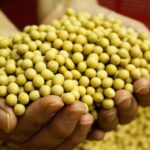Many women in their 50s have busy, demanding lives and can benefit from taking herbs and supplements to help alleviate the often challenging symptoms of menopause.
Many women are responsible for managing a home, raising children, and helping out grandparents. People want to enjoy their partner, work, and social life. Any wonder women can feel stressed, hot and bothered.
Menopause is a natural process where a woman’s body transitions from being able to bear children to the next stage of her life. A woman is considered to be in menopause when she has not had a menstrual period for twelve consecutive months. Many women experience challenging symptoms in the months or years leading up to menopause, known as perimenopause. These symptoms can include irregular menstrual cycles, flushing sensations, irritability and night sweats.
A woman’s periods will continue until 45-55 years. A woman’s periods can become irregular starting at age 35 when she doesn’t have enough eggs left to produce an ovulatory cycle each month. This refers to the period of time around menopause.
A woman is in menopause after 12 months without periods. Although symptoms may go away after some time, they can last for years for some women. Hot flushes result from the drop in oestrogen and are associated with our reaction to stress and our Metabolism :
– Metabolism is the name given to the chemical processes that happen inside the body all the time.
– Your metabolism is the rate at which your body burns kilojoules.
The rate at which your body burns calories (metabolic rate) is influenced by many factors, including your age, gender, ratio of muscle to fat, how active you are, and how well your hormones are functioning.
The early onset of menopause can be influenced by:
- Body weight, under or overweight.
- Medical drugs and surgical interventions that create a dramatic stress on the body with or without the removal of ovaries.
- Prolonged or acute stress itself can bring on menopause.
The gut microbiome is the main regulator of the female hormonal system, which is controlled by the interaction of various endocrine glands and organs within the body.
- The hypothalamus and the pituitary gland that sits just below the hypothalamus reside in the central area of our brain.
- The ovaries which are part of the pelvic reproductive tract.
- The adrenal and thyroid glands play significant roles in ensuring a smooth transition once hormone levels change.
- The liver is tucked away under your ribs on the right side of your abdomen. Among the amazing processes within the liver, is the breakdown of hormones when they have served their purpose. These degraded hormones are excreted via the kidneys.
The Reproductive hormones
The hormones in our body that are responsible for reproduction are made from cholesterol and are called steroid hormones. These hormones are recycled, degraded, and excreted.
The main reproductive hormones involved are:
Oestrogen
- Oestrogen influences the menstrual cycle from puberty to menopause.
- At menopause when periods cease, a weaker form of oestrogen called oestrone is produced by the adrenal glands. Oestrogen also be converted from androgen in our fat, muscle, and skin.
- Oestrogen is excreted via the liver, so it is important that your liver function is in good health. Lifestyle, dietary and herbal medicine can restore optimal function. See below.
- A lack of oestrogen after menopause affects muscle mass and strength, bone density, cardiovascular health general feeling of wellbeing.
Progesterone
- Progesterone prepares our bodies for pregnancy.
- Inhibits androgens and opposes oestrogen.
- Progesterone decreases in the peri-menopause phase and eventually ceases in menopause causing androgen levels to increase.
- Common symptoms associated with low progesterone include brain fog, mood changes, facial hair, increase in fat deposits around the abdomen
- Excretion is via the liver.
Androgens
- Androgens (including testosterone ) are usually thought of as male hormones, but the female body naturally produces a small amount of androgens too. The ovaries, adrenal glands, fat cells and skin cells make the female body’s supply of androgens and produce levels useful for life after menopause.
- Convert into testosterone then to oestrogen.
- Like all hormones and process within the body the androgen levels gradually decline with age. The adrenal glands take over . For some women this may result in loss of hair on the head and growth of facial hair. Other symptoms include a loss of libido, fatigue & lack of well-being
Education is the most important tool for managing this huge change.
The second most important part is a will to want to maintain good health by reducing stress on the body and mind by:
- eating well
- ensuring a quality sleep
- enjoying moderate amount of exercise to maintain cardio fitness and muscular strength
- drinking little alcohol, as it affects healthy function of the digestion and liver
As women age, they often experience a decline in hormones, which can lead to changes in their bodies. For some women, this dramatic change passes with ease. Not so for around 70-80% of women.
When the time comes for menopause, the hot flushes, insomnia, night sweats, weight gain, mood changes, joint pain, and headaches may come as a surprise. The strength of our soft tissues, muscles, and ligaments decreases as time goes on, as does the amount of vaginal secretions. Sounds like ageing doesn’t it!
If the vaginal tissue is too dry, it may cause problems with sexual intercourse or lead to urinary tract infections. Making lifestyle adjustments and talking to our partners honestly can make a big difference in our experiences and future wellbeing.
We suggest women
Get tested for iron deficiency anaemia . Gentle iron formulas can help, but the best way to treat this is to reduce the amount of blood loss. Vitamins C and Zinc are also important for maintaining the integrity of your uterine and vaginal tissues.
We strongly advocate that you understand the need to reduce oestrogen dominance through improved liver function. Herbal medicine and increasing helpful phyto-oestrogenic foods can help with this.
Loss of libido and Vaginal Dryness
Intimacy can become an issue during menopause. A Phyto-oestrogen cream can keep the vulva and vaginal tissue healthy. Lubricating with a natural gel may make the difference between your partner saying yes or no. It’s important to be able to discuss sex openly, so that you never feel like you’re compromising yourself.
Just because one company is marketing their product to women, it does not mean that the product will be useful to all women.
Menopause and Herbs
Different cultures throughout the world have used healing plants as the basis for their medicines at some point. The plants that are used for their medicinal properties can have leaves, seeds, roots, or flowers as the part used.
The herbs that are commonly used to help with menopausal symptoms are: black cohosh, dong quai, evening primrose, hops, Korean ginseng, linseed (flaxseed), red clover, St John’s wort, and wild yam. Some herbs help with low sex drive, while others are more commonly used to help with things like insomnia, anxiety, and fatigue.
Herbs and/or herb mixtures can be dried and mixed with boiling water in order to make teas, extracts that are concentrated in alcohol and water, or made into tablets and powders. Herbs can also be used external as a poultice (herbs made into a paste and applied to the skin) or made into creams and ointments.
Over the counter herbal products
You can buy CAM products to treat menopause symptoms without a prescription, either in stores or online. There are many different formulas available, which may include herbs and/or nutrients. How effective these preparations are can differ a lot because of the herbs used in combination, as well as how high-quality or how much of the herbs are used.
If you want to know more about herbal remedies, talk to a health professional who knows about them, like a herbalist or naturopath.
We know that approximately 13% of Australian women use CAM therapies to manage hot flushes, with the three most commonly used being phytoestrogens (plant-based female hormones), evening primrose oil and ginseng.[1] We also know that these are not necessarily the most effective remedies, and only about 25% of these women consult an expert for advice. Because of this, women may be choosing options that are not ideal or even helpful.
When buying herbal medicines over the counter, you need to consider some of these factors:
- The quality and standard of herbal preparations, including those available over the counter and online, can vary considerably
- Some herbal products can interact with other pharmaceutical therapies, but their labels might not necessarily carry a warning
- The best way to use herbal remedies is under the guidance of a well-trained herbalist/naturopath.
Hot flushes and night sweats
Few studies have evaluated their efficacy, however, and most have small sample sizes. Herbal therapies are often sought after by menopausal women to alleviate hot flushes and night sweats, However, there is little evidence to support their use as most studies evaluating their efficacy are small. Herbs that have been found to be effective in reducing hot flushes are better than those that have no effect. Some have not been studied rigorously.
The most extensively researched herb for managing menopausal symptoms is black cohosh. There are many different products containing this herb available, varying in quality and effectiveness. It can also be combined with other herbs to create a custom formula specifically for hot flushes. The evidence is inconclusive–some studies suggest the treatment is effective while others don’t.
St John’s wort has been shown to be significantly more effective than placebo in treating menopausal symptoms, either on its own or in combination with other herbs. If you take St John’s wort in combination with black cohosh or passionflower, you may experience significantly fewer hot flushes and an improved mood, compared to if you take a placebo.
Hops contain a plant-based estrogen that has been shown to be effective in treating menopausal symptoms such as hot flashes.
Red clover contains phytoestrogens called isoflavones that may help ease hot flushes and night sweats, but seemingly more so in women who are postmenopausal than perimenopausal.
Some other herbal therapies that are sometimes used for hot flushes are dong quai, evening primrose, Korean ginseng, and linseed (flaxseed). However, there is not enough evidence to show that these herbs are actually effective, or that they are any better than a placebo.
Mood changes, fatigue and insomnia (sleeplessness)
The most common mood changes that menopausal women experience are irritability, anxiety and depression. Poor sleep and fatigue often lead to changes in mood, and night-time symptoms can certainly contribute to this. Herbal therapies may help improve these symptoms.
Korean ginseng is a traditional remedy for fatigue, physical exhaustion, and low physical stamina. It may also increase vitality and improve your concentration. One of the most common self-prescribed herbs for menopausal symptoms is black cohosh because it can help cope with stress and has female hormone (oestrogenic) properties.
Chamomile’s relaxed and sedative action can be helpful for people who have difficulty sleeping or are anxious. Hops have been used traditionally to treat anxiety, stress and insomnia associated with these conditions. These three herbs can improve your sleep quality and reduce stress and anxiety.
St John’s wort is commonly used to help with anxiety, irritability, and depressed moods that are associated with menopause.
Vaginal changes
Black cohosh, either in pill form or as a cream or pessary, may help with vaginal dryness. Black cohosh can only be obtained in the form of a pessary or vaginal cream from naturopaths.
Linseed (flaxseed) has been shown to reduce vaginal dryness by increasing moisture in the vaginal cells.
Low libido (sex drive)
Many cultures have herbs that are known to increase libido. There is some debate as to whether these herbs actually stimulate your sexual urge or if they have a hormonal effect. Some people believe that adaptogens can improve sexual desire by providing energy and supporting emotional stability.
Your libido can be influenced by several things, such as how well you get along with your partner, your health and wellbeing in general, your body image, and how much moisture there is in your vagina. If sex is painful because of vaginal dryness, that can also lower your libido. You should not only use herbal medicine to try to improve your low libido, but also consider other important factors in your life that could be affecting it, such as your lifestyle, nutrition, and relationships.
Herbs that have been traditionally used to treat low libido or sex drive include Korean ginseng, tribulus, and maca. Many formulas that claim to improve women’s sex drive are marketed.
Menopausal women who take Korean ginseng may see an improvement in sexual function and arousal.
A small study of 45 postmenopausal women found that tribulus reduced pain and improved sexual desire, arousal, lubrication and ability to achieve orgasm, compared to placebo.
Maca root is popularly known for its purported ability to improve sexual function. However, there is limited evidence to support these claims.



